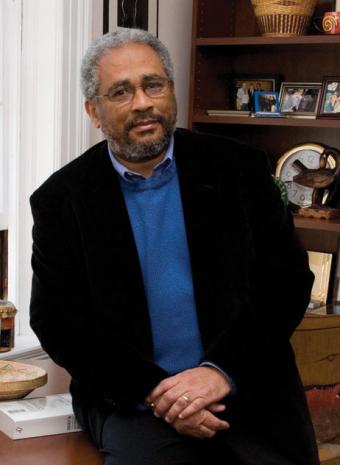PROVIDENCE, R.I. [Brown University] — Brown University President Ruth J. Simmons will officially open the 247th academic year during Opening Convocation, Wednesday, Sept. 1, 2010, at 4 p.m. on the College Green. Anthony Bogues, the Harmon Family Professor of Africana Studies, will deliver the keynote address titled “‘Tell The Minister We Are Human Too!’ To be Human in Today’s World: Is it Possible?”
The Opening Convocation ceremony begins with the traditional procession of incoming students through the Van Wickle Gates onto the College Green. This year, Brown welcomes 1,504 first-year students, 552 graduate students, 97 medical students, and 54 transfer students (six of whom are enrolled in the Resumed Undergraduate Education program). The new first-year students — the Class of 2014 — will be graduating seniors when Brown celebrates its 250th anniversary.
Anthony Bogues
Anthony Bogues is the Harmon Family Professor of Africana Studies, affiliated with Brown’s Department of Political Science and Department of Modern Culture and Media. He is also a faculty fellow at the Cogut Center for Humanities. Bogues is the author of four books, two edited volumes, and numerous articles in the fields of intellectual history, political thought, literary and cultural studies. He is considered to be a major figure in the field of Africana intellectual history and political theory and one of the leading intellectual historians of the Caribbean.
The recipient of many awards for teaching and scholarship, Bogues is currently working on a book about freedom and human emancipation and a film documentary on the First Conference of Black Writers and Artists held in Paris in 1956. Bogues served as chair of Africana studies at Brown from 2003-09, as well as on numerous University committees. He is an associate director of the Center for Caribbean Thought at the University of the West Indies and an honorary professor at the University of Cape Town in South Africa, where he was recently the Distinguished Mellon Visiting Fellow. He is an associate editor of the Caribbean journal Small Axe and a member of the editorial collective of one of the leading humanities journals, Boundary 2: An International Journal of Literature and Culture.
The Class of 2014
A total of 30,135 people applied to be members of Brown’s undergraduate Class of 2014. The University admitted 2,816 students (9.3 percent), yielding a matriculating class of 1,503.
Other Class of 2014 statistics:
- Gender: 715 men (48%) and 788 women (52%);
- Diversity: 35 percent of the Class of 2014 are students of color;
- First-generation: 14 percent of students are first-generation college students;
- Academic interests: The most popular intended areas of concentration are engineering, biology, human biology, economics, and international relations;
- Geographic area: The Class of 2014 comes from 49 U.S. states and 59 countries. Thirteen percent of students are international. The top foreign countries represented are China, Canada, India, Korea, and Singapore.
The Graduate School
A total of 9,029 students applied to begin master’s and doctoral programs at Brown. The University admitted 1,339 (15%), yielding a matriculating class of 552. Selectivity for Ph.D. programs was 10 percent. Thirty-three percent of incoming graduate students are international. The top foreign countries represented are China, Korea, Canada, Taiwan, and Germany.
The Warren Alpert Medical School
Ninety-seven new medical students will begin their studies at Brown. The Warren Alpert Medical School received 4,111 applications for its Class of 2014. The medical student body has been increasing in recent years, drawing students from several admission routes. Roughly half of the new students are entering the medical school portion of Brown's eight-year Program in Liberal Medical Education, which they entered as high school graduates. Overall, matriculating medical students range in age from 20 to 30. About 55 percent of incoming students concentrated in physical and life sciences or computer science as undergraduates, while 37 percent majored in the humanities.

